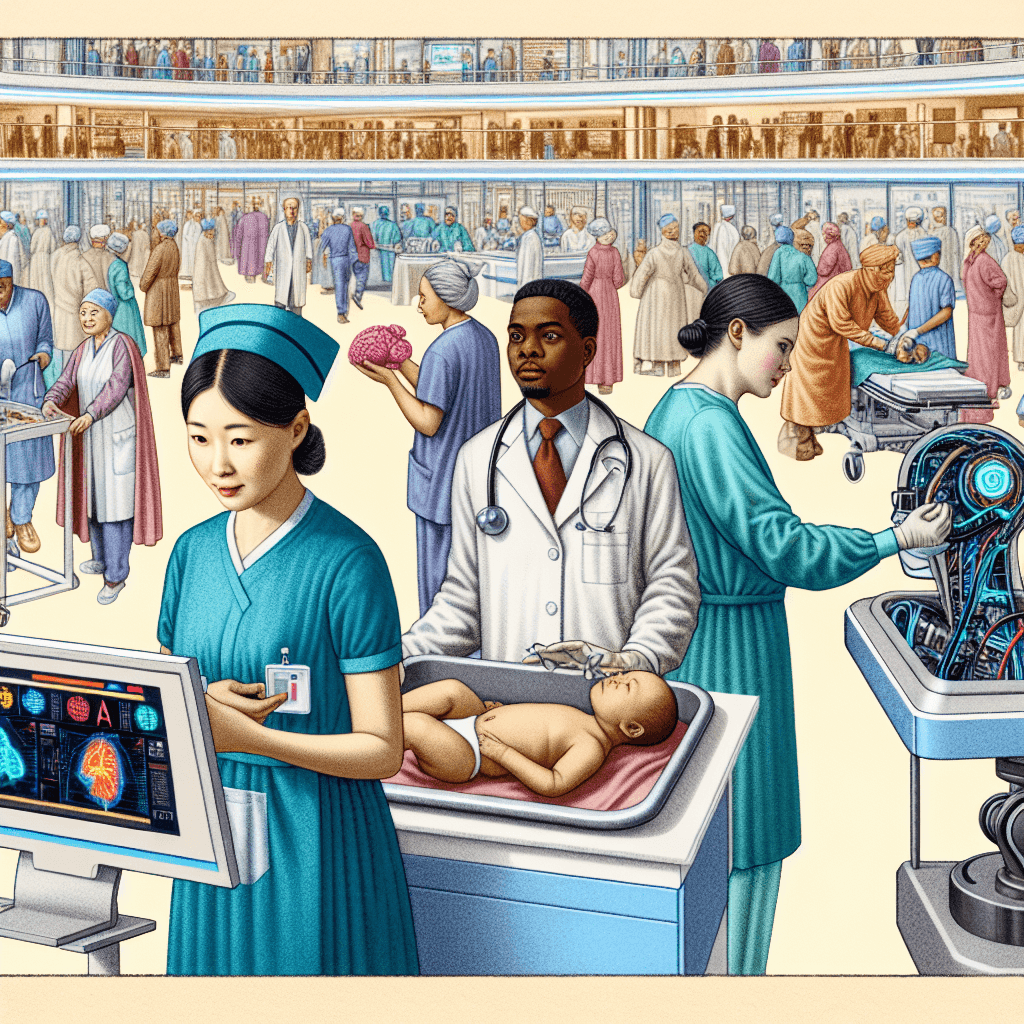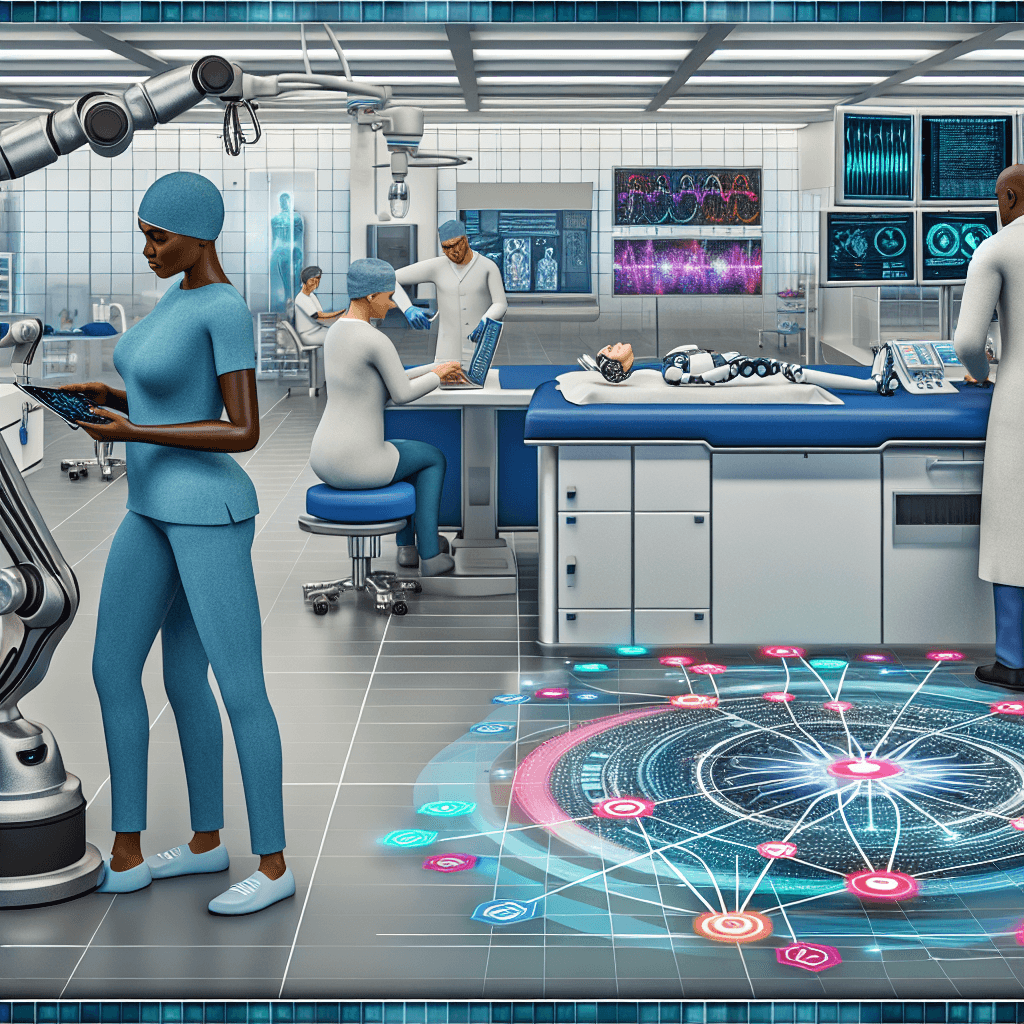Discover how AI is revolutionizing healthcare services, increasing efficiency and improving patient outcomes. Learn more in this informative article.
How AI is Driving Efficiency in Healthcare Services

Table of Contents
“Revolutionizing healthcare with AI – improving efficiency, saving lives.”
Introduction
Artificial intelligence (AI) has been rapidly transforming various industries, and healthcare is no exception. With its ability to analyze vast amounts of data and make accurate predictions, AI is driving efficiency in healthcare services. This technology is revolutionizing the way healthcare providers deliver care, making processes more streamlined and effective. In this introduction, we will explore how AI is being utilized in healthcare and the impact it is having on the industry. From improving patient outcomes to reducing costs, AI is proving to be a valuable tool in driving efficiency in healthcare services.
The Role of AI in Streamlining Patient Care Processes
Artificial intelligence (AI) has been making waves in various industries, and healthcare is no exception. With its ability to analyze vast amounts of data and make predictions, AI has the potential to revolutionize the way patient care processes are managed. In this article, we will explore the role of AI in streamlining patient care processes and how it is driving efficiency in healthcare services.
One of the main challenges in healthcare is managing the large amount of data generated by patients. From medical records to lab results, there is a constant need to organize and analyze this data to make informed decisions about patient care. This is where AI comes in. With its ability to process and analyze data at a much faster rate than humans, AI can help healthcare providers make more accurate and timely decisions.
One of the key areas where AI is being utilized is in medical imaging. Traditionally, radiologists would manually analyze medical images such as X-rays and MRIs. This process is time-consuming and prone to human error. With AI, medical images can be analyzed in a matter of seconds, allowing for quicker diagnosis and treatment. AI algorithms can also detect patterns and anomalies that may be missed by the human eye, leading to more accurate diagnoses.
Another area where AI is streamlining patient care processes is in patient monitoring. With the rise of wearable devices and sensors, there is an abundance of data being collected on patients’ vital signs and health status. AI can analyze this data in real-time and alert healthcare providers of any abnormalities or potential health risks. This allows for early intervention and can prevent serious health complications.
AI is also being used to improve medication management. With the help of AI, healthcare providers can analyze a patient’s medical history, current medications, and potential drug interactions to determine the most effective treatment plan. This not only ensures that patients receive the right medication but also reduces the risk of adverse reactions.
In addition to improving patient care processes, AI is also driving efficiency in healthcare services by automating administrative tasks. Tasks such as scheduling appointments, managing medical records, and processing insurance claims can be time-consuming and prone to errors. With AI, these tasks can be automated, freeing up healthcare providers’ time to focus on patient care. This not only saves time and resources but also reduces the risk of human error.
Moreover, AI is also being used to improve the patient experience. Chatbots powered by AI can assist patients with basic inquiries and provide them with information about their health conditions and treatment plans. This not only improves patient satisfaction but also reduces the burden on healthcare providers, allowing them to focus on more complex tasks.
However, with the integration of AI in healthcare, there are also concerns about the potential loss of jobs for healthcare professionals. While it is true that some tasks may be automated, AI is not meant to replace healthcare providers. Instead, it is meant to assist them in their work and improve patient outcomes. Healthcare professionals will still play a crucial role in patient care, and their expertise and judgment cannot be replaced by AI.
In conclusion, AI is playing a significant role in streamlining patient care processes and driving efficiency in healthcare services. From medical imaging to patient monitoring and administrative tasks, AI is transforming the way healthcare is delivered. While there may be concerns about its impact on jobs, the benefits of AI in healthcare cannot be ignored. As technology continues to advance, we can expect to see even more innovative uses of AI in the healthcare industry, ultimately leading to better patient outcomes.
How AI is Improving Diagnostic Accuracy and Speed

Artificial intelligence (AI) has been making waves in various industries, and healthcare is no exception. With its ability to analyze vast amounts of data and make accurate predictions, AI is revolutionizing the way healthcare services are delivered. One area where AI is making a significant impact is in diagnostic accuracy and speed.
Traditionally, diagnosing medical conditions has been a time-consuming and error-prone process. Doctors rely on their knowledge and experience to interpret symptoms and test results, which can lead to misdiagnosis or delayed diagnosis. However, with the help of AI, this process is becoming more efficient and accurate.
One of the main ways AI is improving diagnostic accuracy is through image recognition. Medical imaging, such as X-rays, MRIs, and CT scans, plays a crucial role in diagnosing various conditions. However, interpreting these images can be challenging, and even the most experienced radiologists can miss subtle abnormalities. AI-powered image recognition software can analyze medical images and identify abnormalities that may be missed by the human eye. This not only improves diagnostic accuracy but also speeds up the process, allowing for faster treatment.
Moreover, AI can also assist in diagnosing rare diseases. These conditions are often challenging to diagnose, as they have symptoms that overlap with more common illnesses. AI algorithms can analyze a patient’s symptoms, medical history, and test results to identify patterns that may indicate a rare disease. This can save valuable time and prevent misdiagnosis, which can have severe consequences for the patient’s health.
Another way AI is driving efficiency in diagnostic accuracy is through predictive analytics. By analyzing vast amounts of patient data, AI algorithms can identify patterns and predict potential health issues. This can help doctors make more accurate diagnoses and develop personalized treatment plans for their patients. For example, AI can analyze a patient’s genetic data and predict their risk of developing certain diseases, allowing for early intervention and prevention.
In addition to improving diagnostic accuracy, AI is also speeding up the diagnostic process. With the help of natural language processing (NLP), AI can analyze a patient’s symptoms and medical history to generate a list of potential diagnoses. This can save doctors valuable time, as they no longer have to manually sift through a patient’s medical records and test results. NLP can also assist in prioritizing patients based on the severity of their condition, allowing doctors to focus on those who require immediate attention.
Furthermore, AI is also improving the accuracy of medical tests. For example, AI-powered algorithms can analyze blood tests and identify potential errors or abnormalities. This can prevent misdiagnosis and unnecessary treatments, saving patients from potential harm and reducing healthcare costs.
AI is also playing a crucial role in improving the accuracy of cancer diagnosis. With the help of machine learning algorithms, AI can analyze medical images and identify cancerous cells with a high level of accuracy. This not only speeds up the diagnostic process but also reduces the chances of misdiagnosis, which can have life-threatening consequences for the patient.
In conclusion, AI is driving efficiency in healthcare services by improving diagnostic accuracy and speed. With its ability to analyze vast amounts of data and identify patterns, AI is revolutionizing the way medical conditions are diagnosed. This not only saves valuable time but also improves patient outcomes and reduces healthcare costs. As AI continues to advance, we can expect to see even more significant improvements in diagnostic accuracy and speed, ultimately leading to better healthcare services for all.
The Impact of AI on Healthcare Supply Chain Management
The healthcare industry is constantly evolving, with new technologies and innovations being introduced to improve patient care and streamline processes. One of the most significant advancements in recent years is the use of artificial intelligence (AI) in healthcare services. AI has the potential to revolutionize the way healthcare supply chain management operates, leading to increased efficiency and cost savings.
The supply chain in healthcare refers to the process of managing the flow of medical supplies, equipment, and pharmaceuticals from manufacturers to healthcare providers. This includes everything from ordering and inventory management to distribution and delivery. Traditionally, this process has been manual and time-consuming, with a high risk of errors and delays. However, with the integration of AI, the supply chain can be optimized and streamlined, resulting in significant improvements in efficiency.
One of the main ways AI is driving efficiency in healthcare supply chain management is through predictive analytics. AI algorithms can analyze vast amounts of data, including historical purchasing patterns, inventory levels, and patient demand, to predict future needs accurately. This allows healthcare providers to proactively order supplies and avoid stockouts, reducing the risk of delays in patient care. Additionally, AI can identify patterns and trends in supply chain data, enabling healthcare organizations to make data-driven decisions and optimize their inventory levels.
Another significant impact of AI on healthcare supply chain management is the use of robotics and automation. With the help of AI-powered robots, routine tasks such as picking, packing, and shipping can be automated, reducing the need for manual labor. This not only speeds up the supply chain process but also minimizes the risk of human error. Furthermore, robots can work 24/7, increasing productivity and reducing costs for healthcare organizations.
AI is also being used to improve supply chain visibility and transparency. With the integration of AI-powered sensors and tracking devices, healthcare providers can monitor the location and condition of medical supplies in real-time. This allows for better inventory management, as well as the ability to quickly identify and address any issues that may arise, such as delays in delivery or damaged products. This level of visibility also helps to prevent theft and counterfeiting, ensuring that patients receive safe and authentic medical supplies.
In addition to improving efficiency, AI is also driving cost savings in healthcare supply chain management. By optimizing inventory levels, reducing the risk of stockouts, and automating routine tasks, healthcare organizations can save on labor and storage costs. Furthermore, with the ability to predict demand accurately, healthcare providers can negotiate better prices with suppliers and avoid overstocking on expensive items.
However, the integration of AI in healthcare supply chain management does come with its challenges. One of the main concerns is the potential job displacement for workers in the supply chain industry. As more tasks become automated, there may be a decrease in the need for manual labor, leading to job losses. To address this issue, healthcare organizations must invest in retraining and upskilling their workforce to adapt to the changing landscape.
In conclusion, AI is making a significant impact on healthcare supply chain management, driving efficiency, cost savings, and improved patient care. With the ability to predict demand, automate routine tasks, and improve visibility, AI is revolutionizing the way medical supplies are managed and distributed. However, it is essential to address the potential challenges and ensure that the integration of AI is done in a responsible and ethical manner. As technology continues to advance, the healthcare industry must embrace AI to stay competitive and provide the best possible care for patients.
Utilizing AI for Predictive Analytics in Healthcare Decision Making
Artificial intelligence (AI) has been making waves in various industries, and healthcare is no exception. With its ability to analyze vast amounts of data and make predictions, AI is revolutionizing the way healthcare services are delivered. One area where AI is particularly useful is in predictive analytics, which is the use of data, statistical algorithms, and machine learning techniques to identify the likelihood of future outcomes. In this article, we will explore how AI is driving efficiency in healthcare services through its application in predictive analytics for decision making.
One of the main challenges in healthcare is the ability to accurately predict and prevent adverse events. This is where AI comes in, as it can analyze large datasets and identify patterns that humans may not be able to detect. By using predictive analytics, healthcare providers can identify patients who are at high risk of developing certain conditions or experiencing adverse events. This allows for early intervention and prevention, ultimately leading to better health outcomes and reduced healthcare costs.
One example of how AI is being used for predictive analytics in healthcare decision making is in the field of cardiology. Heart disease is the leading cause of death globally, and early detection is crucial for effective treatment. AI algorithms can analyze a patient’s medical history, lifestyle factors, and genetic data to predict their risk of developing heart disease. This information can then be used by healthcare providers to develop personalized prevention and treatment plans for their patients.
Another area where AI is driving efficiency in healthcare services is in the prediction of hospital readmissions. Hospital readmissions are not only costly but also indicate a failure in the initial treatment or management of a patient’s condition. By using predictive analytics, healthcare providers can identify patients who are at high risk of being readmitted and take proactive measures to prevent it. This could include providing additional support and resources to patients after discharge or adjusting their treatment plan to better suit their needs.
AI is also being utilized for predictive analytics in the field of oncology. Cancer treatment is complex and often involves multiple rounds of chemotherapy, radiation, and surgery. AI algorithms can analyze a patient’s medical history, genetic data, and treatment response to predict the most effective treatment plan for that individual. This not only improves the chances of successful treatment but also reduces the risk of unnecessary and potentially harmful procedures.
In addition to improving patient outcomes, AI is also driving efficiency in healthcare services by streamlining administrative tasks. For example, AI-powered chatbots can handle routine patient inquiries, freeing up healthcare providers’ time to focus on more critical tasks. AI can also assist with scheduling appointments, managing electronic health records, and even predicting staffing needs based on patient volume.
One of the concerns surrounding the use of AI in healthcare is the potential for bias in decision making. However, with proper data collection and algorithm development, this can be mitigated. It is crucial for healthcare providers to ensure that the data used to train AI algorithms is diverse and representative of the population they serve. Additionally, regular monitoring and auditing of AI systems can help identify and address any biases that may arise.
In conclusion, AI is driving efficiency in healthcare services through its application in predictive analytics for decision making. By accurately predicting and preventing adverse events, identifying high-risk patients, and streamlining administrative tasks, AI is improving patient outcomes and reducing healthcare costs. As technology continues to advance, we can expect to see even more innovative uses of AI in healthcare, ultimately leading to a more efficient and effective healthcare system.
Q&A
1. How is AI being used to improve efficiency in healthcare services?
AI is being used in various ways to improve efficiency in healthcare services. One of the main ways is through automation of routine tasks, such as appointment scheduling and medical record management. This frees up time for healthcare professionals to focus on more complex tasks and improves overall efficiency.
2. Can you give an example of how AI is streamlining processes in healthcare?
Sure, one example is the use of AI-powered chatbots to assist with patient inquiries and triage. These chatbots can quickly and accurately provide information and direct patients to the appropriate resources, reducing the workload on healthcare staff and improving the overall patient experience.
3. How does AI help with medical diagnosis and treatment?
AI can analyze large amounts of medical data and assist healthcare professionals in making accurate diagnoses and treatment plans. This can save time and improve accuracy, leading to more efficient and effective healthcare services.
4. Are there any potential drawbacks to using AI in healthcare?
While AI has many benefits in healthcare, there are also potential drawbacks to consider. These include concerns about data privacy and security, as well as the potential for AI to make errors or perpetuate biases if not properly trained and monitored. It is important for healthcare organizations to carefully consider these factors when implementing AI technology.
Conclusion
In conclusion, AI is playing a crucial role in driving efficiency in healthcare services. With its ability to analyze vast amounts of data, AI is helping healthcare professionals make more accurate diagnoses and treatment plans. It is also streamlining administrative tasks, allowing for more time to be spent on patient care. Additionally, AI is improving patient outcomes by providing personalized and timely care. As technology continues to advance, we can expect AI to further enhance efficiency in healthcare services, ultimately leading to better overall healthcare experiences for patients.








